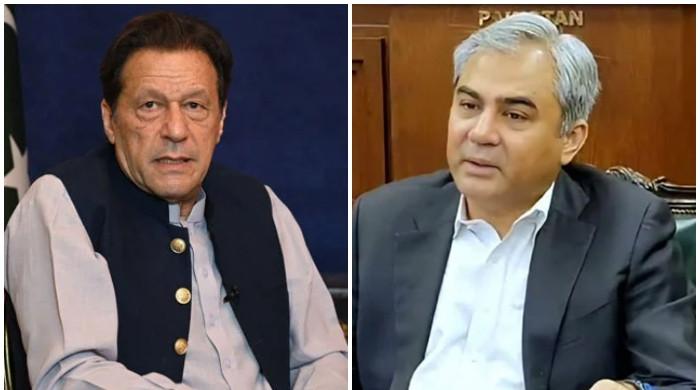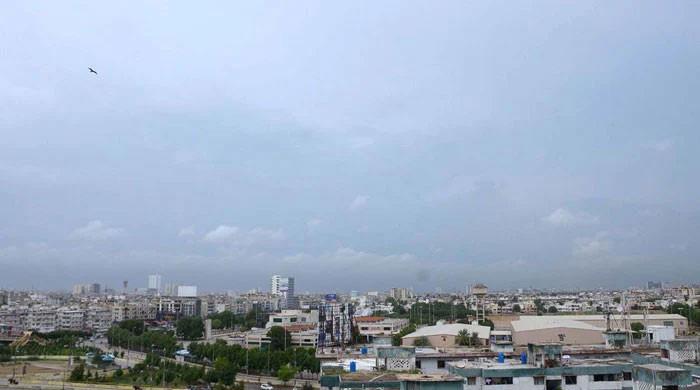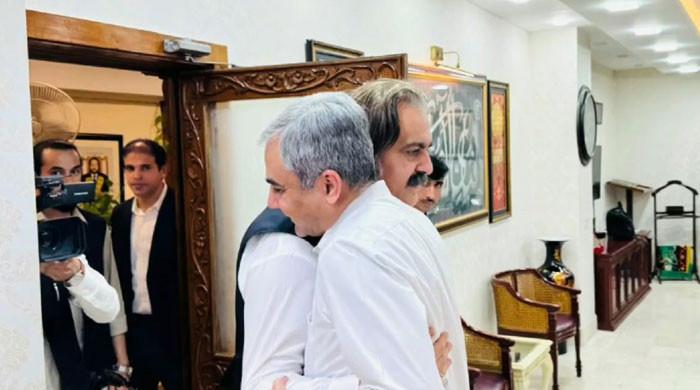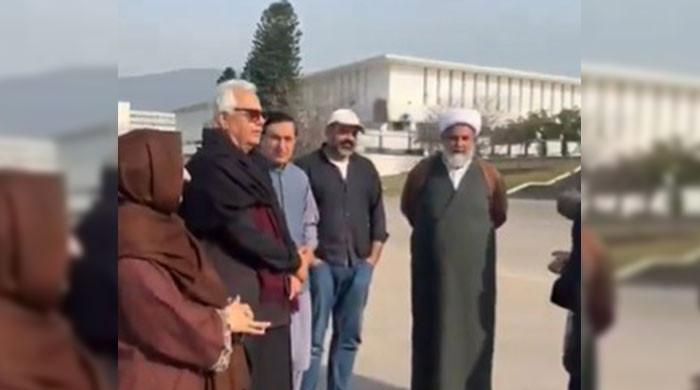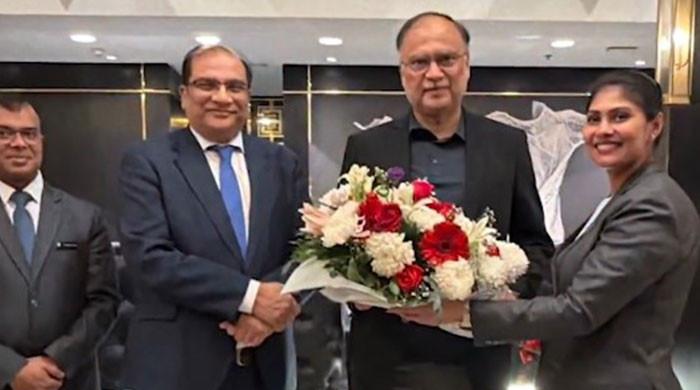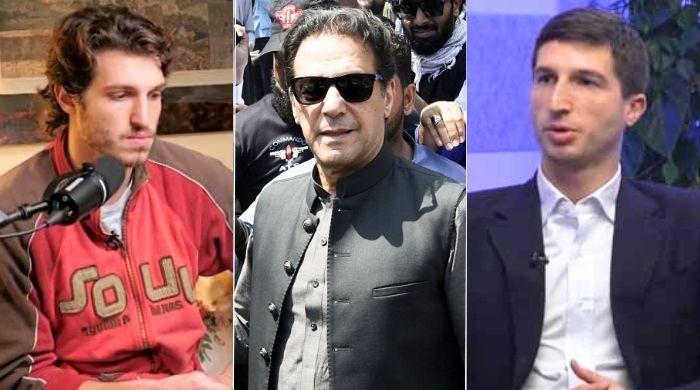Suo motu on Punjab, KP elections was dismissed by 4 to 3: Justice Athar Minallah
Should SC allow its forum to be exploited for advancing political strategies or encourage undemocratic conduct? asks Justice Minallah
April 07, 2023
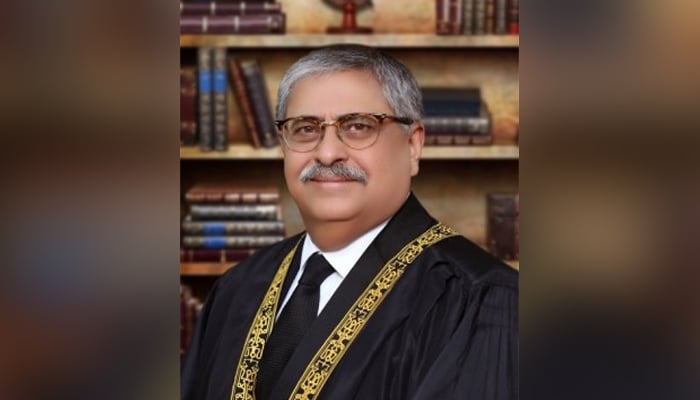
- Legitimacy of court depends on public’s belief that SC is independent, impartial, apolitical, says Justice Minallah.
- Minallah says "suo moto used to legitimise removal of elected prime ministers and endorse military takeovers".
- "Should courts be seen as “advancing political strategies or encouraging undemocratic conduct?" Minallah asks.
ISLAMABAD: Controversy surrounding the Supreme Court’s verdict on Punjab elections took another turn after Justice Athar Minallah, in his detailed order, stated that the case was dismissed by 4 to 3 and clarified that “he had not recused nor had any reason to dissociate himself” from the case.
Justice Minallah stated that he agreed with Justice Yahya Afridi’s note on the dismissal of the petition and his reasoning in the short order was “persuasive” therefore he had no “hesitation in concurring with the decision”.
“I had reiterated my decision by recording my note in the order dated 24.02.2023. I have had the privilege of reading the detailed reasoning recorded by my learned brothers, Syed Mansoor Ali Shah and Jamal Khan Mandokhail, JJs and I agree with their opinion, particularly regarding the final outcome of the petitions and the suo motu assumption of jurisdiction by a majority of 4 to 3 because this was the understanding in the meeting held in the anteroom on 27.02.2023. It is noted that I had not recused nor had any reason to dissociate myself,” said the judge in his detailed note.
Justice Minallah was among the judges who rejected the suo motu notice taken by the Chief Justice of Pakistan (CJP) Umar Ata Bandial regarding the delay in polls in Khyber Pakhtunkhwa (KP) and Punjab on the advice of an SC bench hearing the Ghulam Mehmood Dogar case.
Earlier, CJP Bandial had formed a nine-member bench to hear the suo motu case.
Two of the nine judges recused themselves from the case, while four — Justice Syed Mansoor Ali Shah, Justice Jamal Khan Mandokhail, Justice Yahya Afridi, and Justice Minallah — had dismissed the case.
In his note, Justice Minallah emphasised that "public trust and confidence" are "sacrosanct" for the judiciary to operate effectively.
"The legitimacy of the court’s verdict solely depends on the public’s belief that the Court is an independent, impartial, and apolitical arbiter of disputes between political stakeholders," said the judge. He also explained that the issue of elections in Punjab and Khyber Pakhtunkhwa was political and was being adjudicated by a high court.
'Article 63-A polarised political stakeholders'
The judge noted that the Supreme Court has remained at the centre stage of an "unprecedented charged and polarised political milieu" since April of last year when the former National Assembly deputy speaker dissolved the lower house.
The judge noted that Pakistan Tehreek-e-Insaf (PTI) Chairman Imran Khan's decision to leave the National Assembly had "profound consequences". He noted that with that decision President Arif Alvi invoked the Supreme Court's advisory jurisdiction for the interpretation of Article 63-A.
The former Islamabad high court chief justice stated that the verdict in the Article 63-A case of disregarding votes had a "profound" impact in a "highly charged and polarised political atmosphere". He also noted that the review of the case was pending as well.
"The effects of the interpretation of Article 63A on the ensuing events were far-reaching for the polarised political stakeholders," said Justice Minallah.
Misappropriation of suo moto
Justice Minallah argued that while Article 184(3) had been inserted in the Constitution to “ensure that the fundamental rights of the weak, vulnerable and marginalised classes are protected,” the jurisdiction was “exercised to legitimise the removal of elected prime ministers and endorse military takeovers.”
He then cited the cases of Begum Nusrat Bhutto vs Chief of Army Staff and Federation of Pakistan, Zafar Ali Shah vs General Pervez Musharraf — which were used to remove elected prime ministers — and mentioned that Syed Yousaf Raza Gillani and Nawaz Sharif too were disqualified from office under Article 184(3).
Such moves in the realm of politics and unregulated invocation of suo motu jurisdiction, the justice said, had invited criticism on the “moulded public perceptions which were indeed not favourable for public trust and confidence”.
Responsibilities of the SC
He further clarified that the jurisdiction under Article 184(3) was vested in the “Supreme Court” — which collectively means the CJP and the judges of the court.
“The power under Article 184(3) is inherent and exclusively vests in the Supreme Court”. He stated that it was the duty of the CJP to exercise the jurisdiction in the best interest of the Supreme Court.
Moreover, emphasising the responsibility of the CJP and the courts to maintain to ensure that the jurisdiction under Article 184(3) is exercised to promote and preserve public trust, he wrote that the discretionary powers of the CJP are not “unfettered”.
The justice also stressed that the court “must not allow any stakeholder to use its forum for advancing its political strategy or gaining an advantage over other competitors”.
If political stakeholders are encouraged to bring their disputes to the courts despite having institutions and forums which have been formed by the Constitution for the express purpose of resolving the dispute, not only is the Parliament weakened, but also adversely impacts the public perception of the judiciary.
Reasons explained
Summarising the various reasons for dismissing the case, the justice wrote that since the Lahore High Court had already passed a judgement in the case of election delays and the Peshawar High Court was hearing the case, the petitions and the suo motu jurisdiction “must not be entertained lest it may interfere with the implementation of the judgment of the Lahore High Court and the proceedings pending before the Peshawar High Court.”
He also stated that in case any party was dissatisfied with the verdicts of the high courts, they would then be free to make an appeal before the apex court.
“Indulgence at this stage would be premature and it would unnecessarily prejudice public trust in the independence and impartiality of this Court,” the dissenting note read.
Moreover, Justice Minallah reiterated that the “manner and mode” in which these proceedings were initiated had “unnecessarily” exposed the court to political controversies.
Aside from eroding public confidence, the assumption of suo motu may “raise concerns in the mind of an informed outside observer,” he explained, adding that this would also prejudice the rights of litigants whose cases are pending.
Finally, he underscored the “conduct of the political stakeholders” which had soured matters.
'Toxic'
Raising questions on the dissolution of the assemblies earlier this year, the justice said the political atmosphere of the country was “toxic” and asked if the court should be seen as “advancing political strategies or appear to be encouraging undemocratic conduct.”
“We cannot erase the judgments from the law reports but at least endeavour to restore public trust and confidence so that the past is forgotten to some extent.
When politicians do not approach the appropriate forums and bring their disputes to the courts, the former may win or lose the case, but inevitably the court is the loser,” he concluded.




